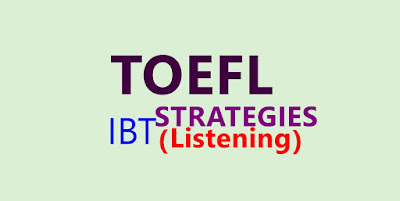TOEFL LISTENING STRATEGIES:
This section is a little bit hard for most of the international students who don't know the strategies. Note taking is allowed in every part of listening. You have to know when and how to take notes. If you know the right way of taking notes, you will do better not only in your TOEFL exam but also your entire university life. After knowing the strategies you should practice on this website https://toefl.kmf.com/mock. In this website, you will find about 48 sample tests for free. Remember: Do not practice without knowing the strategies otherwise you will not know how to improve your skill. Do not waste these sample tests without knowing the method of listening. So be careful.
You can improve your listening skill by hearing the average lectures or speeches on YouTube.
You can improve your listening skill by hearing the average lectures or speeches on YouTube.
There will be about 3-4 listening passages for 60 or 90 minutes for each part. There will be conversational speeches and lectures. Each of the lectures or conversational speeches will be about 2 or 3 minutes. A tip before starting, you should practice your listening in a noisy background because often international students complain that the test center was so noisy that they couldn't concentrate on anything. If you start practicing now in a noisy background eventually you will get adjusted to it. Then there won't be any problem for you. Do not take a risk. Start practicing in a noisy background.
Strategies for listening:
- Do not write everything you hear. First, write the topic of the passage. Sometimes they start with the previous conversation just to make you confused, do not write that. Listen carefully and write the exact topic.
- Do not write any dates or years. Write the nouns you hear.
- Write the adjectives or activities of every noun in points.
- Write clearly because you have to understand your notes for finding answers afterward.
- You can use symbol words for your own understanding. Do not waste time writing full words. As an example, the word is "procrastination'' you can write "prcrstntn" for a symbol. No one will ever read your notes. The notes are only for finding answers later.
- Do not try to memorize anything you hear. Your work is just to write when you hear the speeches or lectures.
- Concentrate when the professor or students stop just for a few moments. It is a hint for writing the point. Concentrate on transitional words like firstly, next, moreover etc. These are also hints for starting an important point.
- Do not write the questions when they ask anything. You should write only the answers or examples. Write the reason for asking the question. Often the questions are like " Why did the professor ask the question or Why did the professor give the example of camouflage? " So, you just need to write the reason or answer.
- Write when they correct their speech or lecture. As an example, " Oh, this is a bacteria, not a virus".
- Write the phrases in short and the reason for saying that. Example: " everyone will do this". Question: why did the professor say that? So write the reason clearly.
- When something is repeating on the speech or lecture, it means the point is important. Listen and write carefully.
- When the professor is changing his tone of speaking, there will be an important point. Listen and write carefully.
Click here for speaking strategies https://learnpro82.blogspot.com/2016/12/toefl-speaking-strategies.html
Thank you for reading the strategies with patience. You will do well if you follow the rules and practice. At first, it won't be easy for you but never give up hope. Eventually, you will improve. Everything takes some time to develop. Share with your friends on facebook, if you like this post.
------Learnpro-----------

0 comments:
Post a Comment